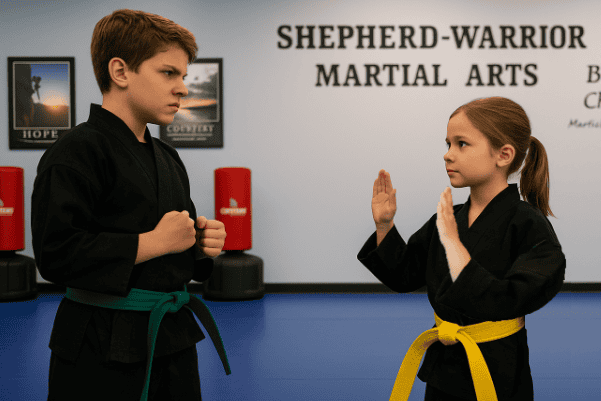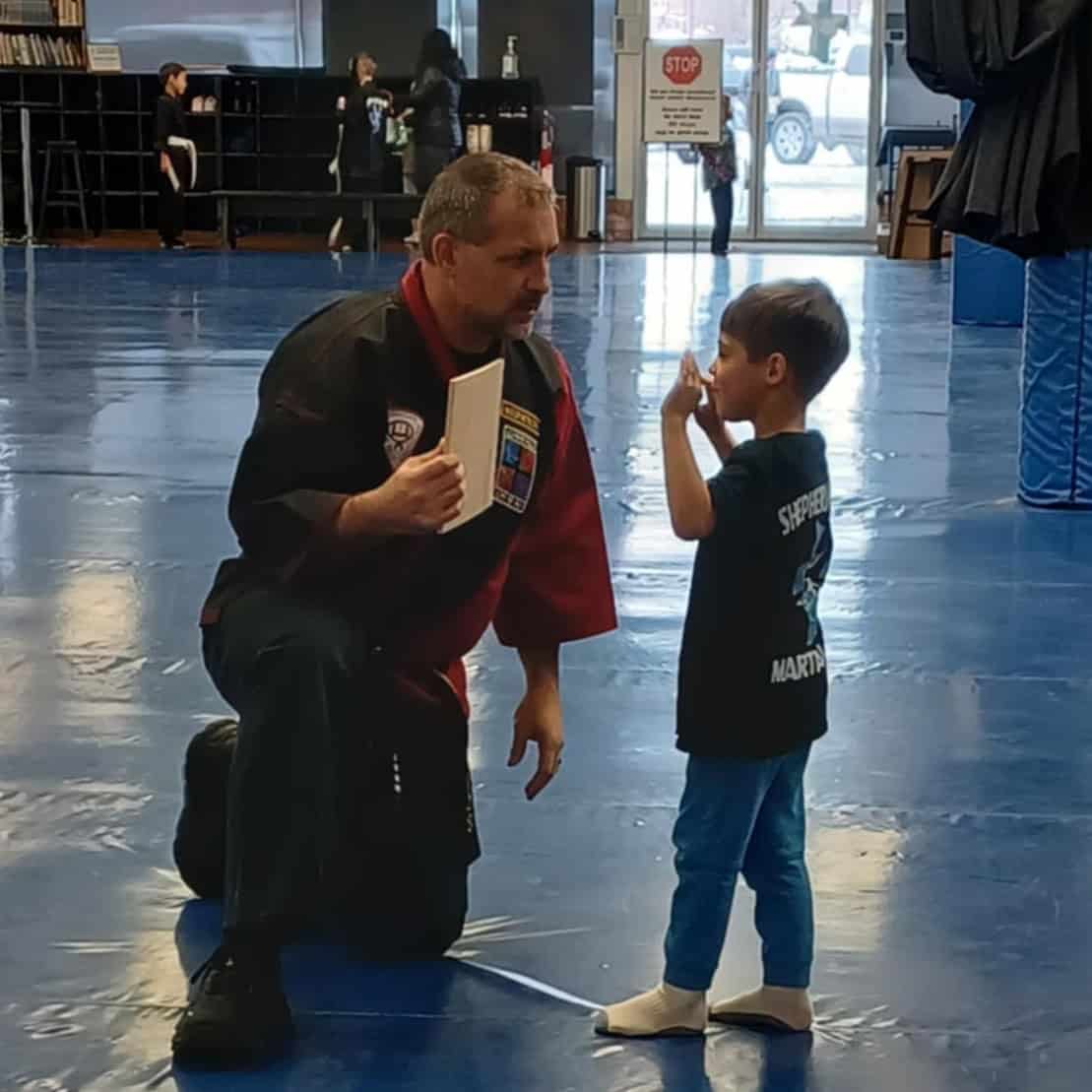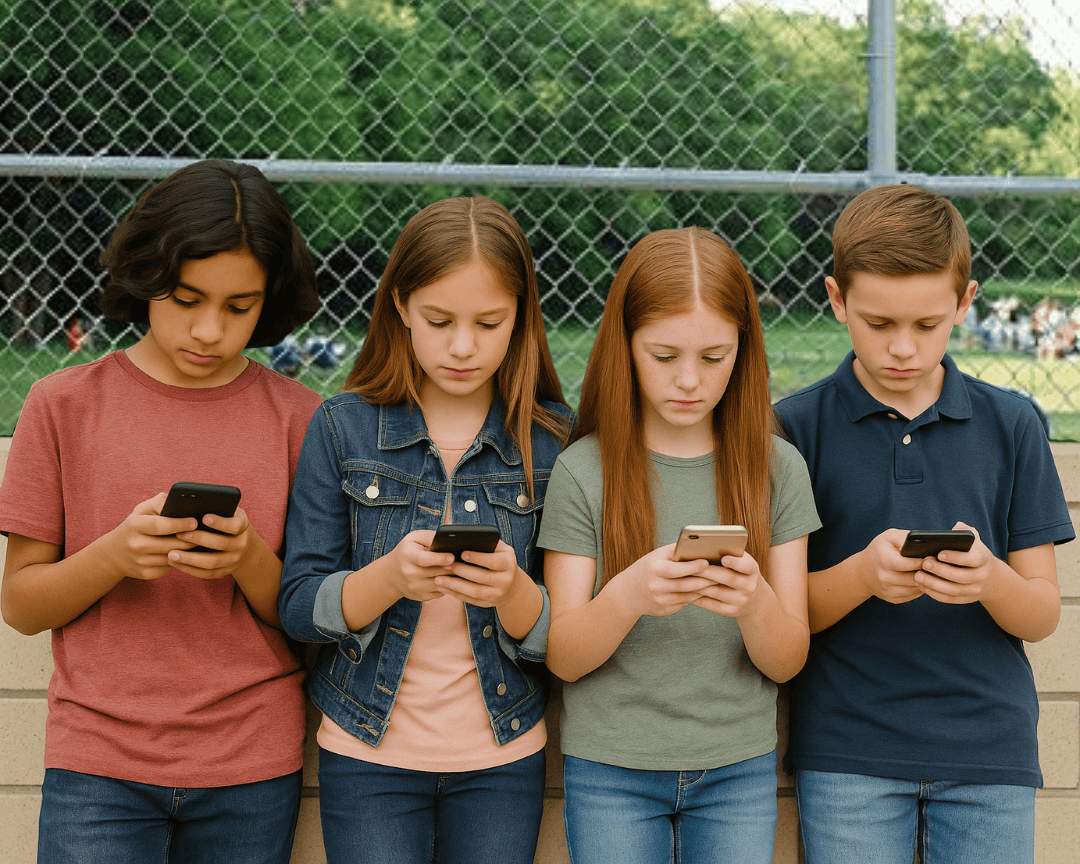Real Strength: How Martial Arts Empowers Kids to Defeat Bullying with Confidence & Compassion
No parent wants to imagine their child being bullied, but the reality is that many kids face hurtful words, peer pressure, intimidation, or even physical aggression—often when adults aren’t around to help. In these moments, children need more than just rules or pep talks—they need real tools. That’s where martial arts comes in.
At Shepherd-Warrior Martial Arts, we believe self-defense is about so much more than just physical techniques. It’s about developing the kind of confidence and inner strength that makes a child less likely to be targeted in the first place – and more prepared to respond with calm, clarity, and courage if bullying ever does occur.
Let’s explore how training in a Christ-centered martial arts environment helps kids become bully-proof – through awareness, verbal defense, physical preparedness, and the kind of character that disarms aggression without escalating it.
The Real Power Behind Anti-Bullying Training
Martial arts teaches children how to carry themselves with presence. That might sound like a small thing, but posture, eye contact, tone of voice, and confidence all make a child less likely to be seen as an “easy target.”
In class, we teach kids to stand tall, look people in the eye, and speak clearly—all non-physical habits that naturally deter bullies. And if a situation escalates? Our students learn exactly how to react safely and appropriately, with the confidence to either de-escalate the situation or defend themselves if absolutely necessary.

One of the most powerful tools we teach is boundary-setting – a critical life skill for kids to learn early. Phrases like “Back off,” or “Stop. That’s not okay,” are practiced regularly in class so they become second nature. And when those boundaries are crossed, we help students understand the full range of their options – from walking away with strength to defending themselves with confidence and control.
Real-Life Example: How School Behavior Changes
Let’s say a student is being teased in the lunchroom or excluded at recess. A child without the tools to respond might shrink inward, lash out in anger, or carry that pain home with them. But a student with martial arts training is more likely to breathe, stand tall, and say firmly, “That’s not okay. Stop it, now.” They’ve practiced that exact moment. They’ve rehearsed how it feels to set a verbal boundary. And perhaps most importantly, they know they ought to be treated with respect.
One mom recently told us that after just a few weeks of classes, her 9-year-old daughter calmly stood up to a group of kids mocking another student. She didn’t get aggressive – she spoke up, made eye contact, and said, “That’s not cool. Teasing is not okay.” The teasing stopped. The bullied child smiled. And her daughter walked away proud.
That’s the kind of confidence that changes school culture—and it’s built in the dojo.
The Christian Perspective: Courage, Peace & Protecting the Vulnerable
The Bible is full of examples of people who stood up to injustice—not with fists, but with faith and resolve. Jesus himself showed us what it means to be strong and gentle at the same time. He never backed down from truth, but He also never struck in anger. Well, there was that one time (John 2:13-17) in the temple where he took the time to fashion a whip…but I digress.
We remind our students of verses like:
“Have nothing to do with foolish, ignorant controversies; you know that they breed quarrels. And the Lord’s servant must not be quarrelsome but kind to everyone…”
—2 Timothy 2:23-24 (ESV)
And also:
“Rescue the weak and the needy; deliver them from the hand of the wicked.”
—Psalm 82:4 (ESV)
We teach our students that being a Shepherd-Warrior means standing up for what is right – protecting others when needed, and using their strength to build up, not tear down. Martial arts is not about fighting. It’s about walking through the world with quiet strength, knowing when to speak, when to walk away, and when (if absolutely necessary) to defend yourself or someone else.
Storytime: Meet Jayden, the Reluctant Hero
Jayden came to our school as a quiet, sweet 8-year-old. His parents said he was being picked on regularly at school – pushed in line, called names, and excluded on the playground. He was starting to pretend to be sick just to avoid going to school.
In class, Jayden was hesitant at first. He didn’t want to make eye contact. He barely spoke above a whisper. But over the weeks, something began to shift. His stance straightened. His voice grew louder. His eyes met ours with growing confidence.
One afternoon, Jayden’s mom came in with tears in her eyes. A classmate had started teasing another student in music class. Jayden stood up, calmly walked over, and said, “It’s not okay to treat people like that.” The teasing stopped. No yelling. No shoving. Just strength.
And that evening, Jayden asked to stay for the advanced class.
That’s what martial arts does – it doesn’t make bullies. It makes defenders.
Why Martial Arts Is a Safe Space to Practice These Skills
In our classes, kids don’t just hear about confidence and kindness—they practice it. Every class is a controlled environment where students are guided through role-playing scenarios, boundary-setting drills, and light physical defense movements that reinforce awareness, control, and calm under pressure.
We never teach aggression. We teach students that the strongest people are the ones who choose peace first. And when peace isn’t an option, our students know how to protect themselves safely—with control, not chaos.
The physical techniques of anti-bullying are designed to be non-lethal, non-aggressive, and purely defensive. Think escapes, blocks, posture, and creating space – not punching or kicking; those techniques are reserved for an aggressor trying to hurt them, not just hurt their feelings.
How This Helps at Home
Parents often report that their children begin to speak up more clearly at home—especially with siblings or during difficult moments. A child who once threw tantrums now takes a breath and uses their words. A child who once let others control their playtime now sets firm, yet respectful boundaries.
This kind of growth is especially visible in areas like:
- Handling teasing from siblings without retaliation
- Walking away from peer conflict instead of escalating it
- Reporting serious issues calmly to a trusted adult
- Refusing to join in when others are making fun of someone
It’s not just about defending against a bully – it’s also about learning not to become one.
The Bigger Picture: Lifelong Self-Worth
Bullying leaves scars—not just physically, but mentally and emotionally. Children who experience bullying can carry that pain for years, sometimes for life. But children who are equipped with confidence, community, and a strong sense of personal value are more likely to recover quickly, or avoid being victimized in the first place.
Martial arts helps kids see themselves as valuable—as strong, capable, and worthy of respect. It teaches them that they have something to offer, and that they never need to shrink themselves to avoid being hurt.
This sense of identity becomes a foundation that protects kids long after they leave the dojo.
A Word to Parents
You don’t have to wait until something bad happens to help your child prepare. In fact, the best time to equip your child with these tools is before they’re needed.
Martial arts doesn’t just teach self-defense—it teaches self-worth. And when a child knows their worth, they walk differently. They speak differently. They treat others differently.
We’ve seen it again and again: a once-shy child walks into our program… and walks out with a warrior’s heart—kind, respectful, and strong.
Want to See That Transformation in Your Child?
If you’re looking for a safe, Christ-centered way to help your child build confidence and handle life’s challenges with courage, Shepherd-Warrior Martial Arts is here for you.
Enroll your child in a Starter Membership or come meet us in person! Let’s build up the next generation of strong, respectful, faith-filled warriors—one kick, one verse, one boundary at a time.
Recent Posts


